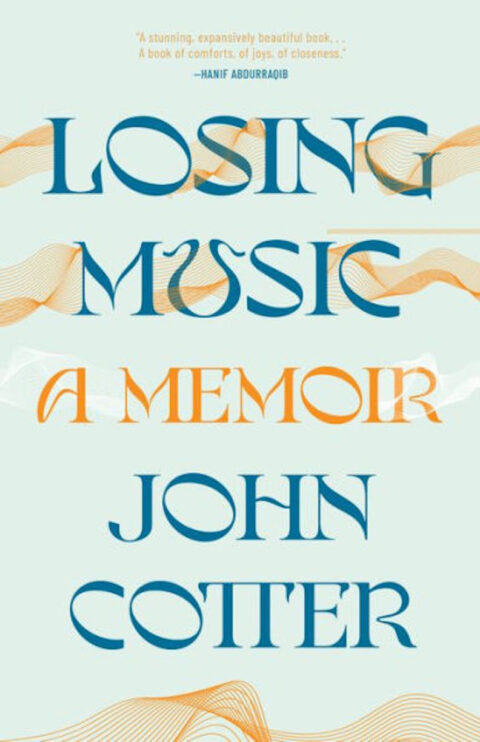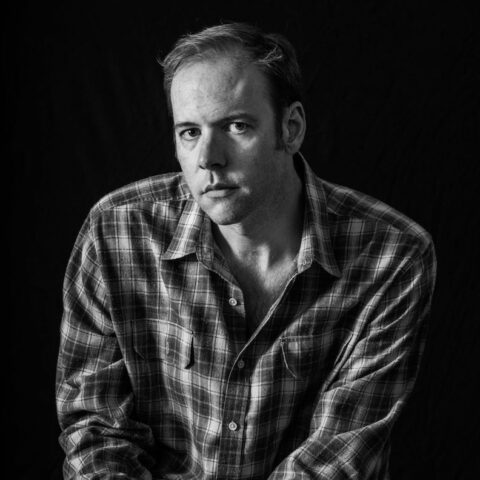John Cotter has Ménière’s Disease, which includes a host of identifiable maladies: vertigo, hearing loss, tinnitus. But as Cotter makes clear in his remarkable memoir, Losing Music, one of Ménière’s cruelest elements is its imprecision. Its causes are uncertain; reliable treatments don’t exist, let alone a cure. Some days are inexplicably better than others, though few are great. Cotter describes a week-long trip to the Mayo Clinic during which he is shot like a pinball from specialist to specialist, only to be met with assessments not much more sophisticated than that of a toddler inspecting a car transmission. “Your ears are really screwed up, okay?” an ENT tells him. “And we’re not going to know why until you’re dead and we cut you open.”
 Losing Music is partly a trauma memoir, where the main story deals with the devastation of illness and loss, and efforts to manage if not transcend it. In 2008, Cotter began to struggle with his hearing, confronting “that weird noise that blotted voices at work and only confused people when I tried to explain.” In time his hearing degrades to the point where he finds it impossible to carry conversations. This makes it increasingly difficult for him to teach, which was draining and ill-paying to start with — at one point he was adjuncting five classes at four schools. Without that sense of purpose, his thoughts turned dark. “Suicide may be a cruelty to those around me, but I saw it as a kindness,” he writes. “They wouldn’t have to watch someone they loved fall irreparably apart.” He leaves home with a knife in his pocket “so I could maintain the option of jabbing it into my own throat.”
Losing Music is partly a trauma memoir, where the main story deals with the devastation of illness and loss, and efforts to manage if not transcend it. In 2008, Cotter began to struggle with his hearing, confronting “that weird noise that blotted voices at work and only confused people when I tried to explain.” In time his hearing degrades to the point where he finds it impossible to carry conversations. This makes it increasingly difficult for him to teach, which was draining and ill-paying to start with — at one point he was adjuncting five classes at four schools. Without that sense of purpose, his thoughts turned dark. “Suicide may be a cruelty to those around me, but I saw it as a kindness,” he writes. “They wouldn’t have to watch someone they loved fall irreparably apart.” He leaves home with a knife in his pocket “so I could maintain the option of jabbing it into my own throat.”
It may be that imprecision and uncertainty are harder on writers; we do better when we have the right words for things. And Cotter — who’s written a novel, Under the Small Lights, and was a founding editor of the much-loved literary website Open Letters Monthly — spends much of the book discussing the language and history of Ménière’s. Not because he’s attempting to deliver an authoritative history of the disease, or even performing the traditional second-chapter, 30,000-foot view trauma-memoir move of delivering a pocket history of the illness under discussion. The trouble here is that the words matter. He’s working to find the correct way to describe what Ménière’s is and does — and, falling short of that, looking for the right words for the flailing.
It’s in this effort that Cotter reconciles himself with his illness, and allows for a sense of humor, of a sort, to fit into the narrative. Central to his explorations is the 17th- and 18th-century author Jonathan Swift, who likely had Ménière’s. (The disease didn’t have well-defined clinical criteria until well into the 20th century; its namesake, French doctor Prosper Ménière, died in 1862.) In Swift’s 1726 novel, Gulliver’s Travels, its title hero confronts the giant Brobdingnags, whose booming voices produce a Ménière’s-like effect: “Being large, their voices are thunderously loud, and their simple cries of astonishment pierced my Ears like that of a Water-Mill.” But beyond the ways Swift’s novel evokes the disease, Cotter observes, Swift captures its broader consequences. It is, he writes, “a satire on the awfulness of human bodies, the paucity of our reason, the weakness in our appetites.”
As with Swift, so with Cotter. The humiliations and imperfections that come with living, the frustrating constant unfitness that Swift wanted to spotlight, is a polestar for Cotter as well. Doctors fall short in matters of diagnosis (“Wow, you test all over the chart”) and bedside manner (“Yeah, you know, a lot of people, they kill themselves”). Society, from antiquity through the Victorian era and into the present day, isolates and shames the disabled. And on a day-to-day basis, Cotter’s ability to communicate with his spouse, friends, and family degrades. At one point he attempts to transcribe a group conversation, and on the page it’s clotted with black spaces. It resembles a Sappho poem, resonant of something but heartbreakingly bereft of particulars.
 Cotter can’t presume to predict the future, or proffer false hope. But nor does Losing Music despair. The book’s concluding mood of optimism is a function of his recognition of his effort to palliate the illness, which in part comes from seeing he is not alone in it. Denied conventional means of socializing in a “normal” society, he takes some solace in others who are displaced. At a Denver community college, he teaches a storytelling class with refugees, with the assistance of photographers. He works for a time at a homeless shelter in rural Colorado whose “philosophy holds that until you separate yourself from the fear you’ve been living in, the chronic stress, you won’t be physically capable of addressing your situation or, frankly, doing anything rational.” It’s an allegory for Cotter’s own disorientation, and a retort to the idea that a good pair of hearing aids or a cochlear implant might fix the problem.
Cotter can’t presume to predict the future, or proffer false hope. But nor does Losing Music despair. The book’s concluding mood of optimism is a function of his recognition of his effort to palliate the illness, which in part comes from seeing he is not alone in it. Denied conventional means of socializing in a “normal” society, he takes some solace in others who are displaced. At a Denver community college, he teaches a storytelling class with refugees, with the assistance of photographers. He works for a time at a homeless shelter in rural Colorado whose “philosophy holds that until you separate yourself from the fear you’ve been living in, the chronic stress, you won’t be physically capable of addressing your situation or, frankly, doing anything rational.” It’s an allegory for Cotter’s own disorientation, and a retort to the idea that a good pair of hearing aids or a cochlear implant might fix the problem.
Thrumming throughout this story, as the title suggests, is music. Many of his favorites have disappeared on him — Bach, Einstein on the Beach, Congolese music, avant-garde jazz and pop. “I was notorious among my friends for abhorrent taste,” he writes, though his taste doesn’t seem so bad. The issue is less about the music than the notoriety — the feeling his taste in music has been so closely lashed to his identity, and that Ménière’s is removing that sense of self. There’s a cruel finality to it: “I was probably never going to hear a live performance of the Ring Cycle, but now I know for sure I never will,” he notes. No reader wants to think the book they’re reading will be the last one; no movie buff wants to know they’ve seen their final film.
It’s unclear to Cotter — and any of us — how much time we have left to consume, love, and share art. Through describing that uncertainty, Cotter reveals its value. Not in a banal, “you don’t know what you’ve got till it’s gone” sense. It’s not just a pang of los — it’s debilitating, soul-scouring. It takes a toll. Cotter looks at the research at how people compensate for sensory deficits, and attacks the canard that lost hearing improves eyesight. “You don’t just hear less, you see less,” he writes. “Weaken one sense and the others fight harder for purchase. Deficit levies a tax.” Sensory loss is sensory loss, and you can’t get it all back. But the emotional and intellectual compensations aren’t insignificant.
[Published by Milkweed Editions on April 11, 2023, 320 pp., $26 hardback.]